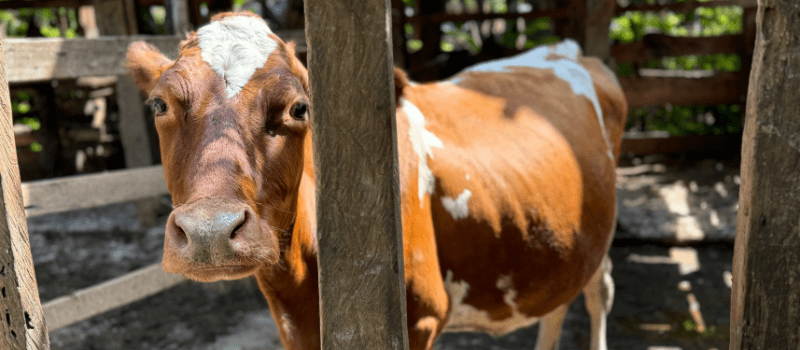#VETSVolunteerVoices brings you stories of our passionate VETS program volunteers from the field. Meet Méli-Jade Léveillé-Blais, an Animal Health Advisor who spent three months in Kenya (May–August 2025) with our local partner, Meru Dairy, training farmers, building local leadership, and strengthening community resilience through better dairy practices.
When I boarded the plane to Kenya, it was only the second time I had ever flown. Until then, most of my experiences away from home had been limited to rotations in other provinces of Canada. Traveling abroad for three months was a huge leap into the unknown—but also a dream come true.
I first heard about the VETS program during a university conference. The chance to combine my passion for bovine medicine with the opportunity to learn from smallholder dairy farmers in Kenya felt like a perfect fit. What convinced me most, though, was the program’s emphasis on supporting women farmers. Knowing that my work would contribute not just to animal health but also to gender equity and community well-being gave this placement a deeper purpose.
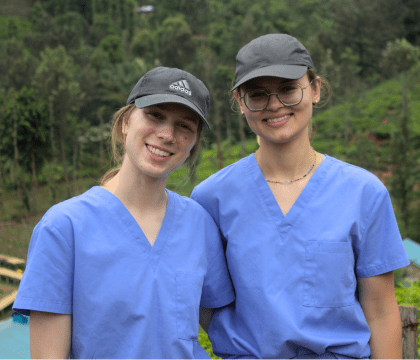 PHOTO: Méli-Jade (R) with fellow volunteer, Grace Friesen (L).
PHOTO: Méli-Jade (R) with fellow volunteer, Grace Friesen (L).
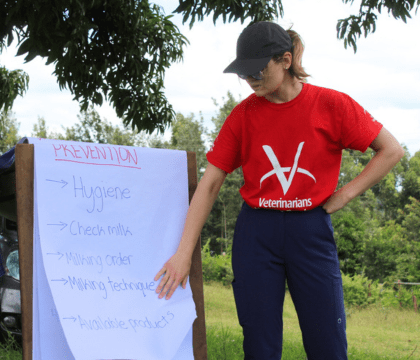 PHOTO: Méli-Jade conducting a training session.
PHOTO: Méli-Jade conducting a training session.
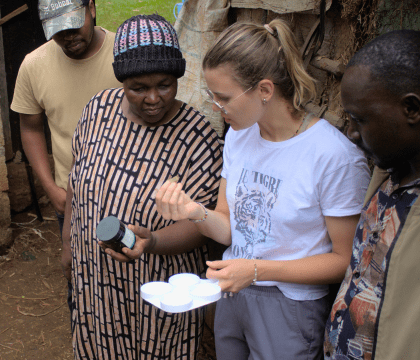 PHOTO: Méli-Jade discussing mastitis with a farmer.
PHOTO: Méli-Jade discussing mastitis with a farmer.
Training and Farm Visits
As an Animal Health Advisor with Meru Dairy, I spent most of my time leading training sessions and conducting farm visits. Alongside my fellow VETS volunteer Grace Friesen, we developed presentations on calf rearing, breeding efficiency, mastitis management, nutrition, and cow comfort.
Each day, we traveled to different Meru Dairy societies, sharing knowledge, answering questions, and—most importantly—listening. Farmers were eager to learn, often asking us to return and cover new topics. Their engagement was inspiring, and the enthusiasm of women farmers, even in male-dominated groups, stood out to me.
Farm visits were equally rewarding. We could see the impact of previous VWB volunteers’ work firsthand—farmers proudly showing us the changes they had made and the improvements those changes brought. It reminded me that our role wasn’t to provide all the answers, but to contribute a piece to a much larger, ongoing journey.
Building Local Leadership
One highlight was a three-day training program we designed for Community One Health Champions (COHCs). We covered everything from calf care to nutrition to herd genetics. A major takeaway was helping farmers see that they had agency in selecting the best bulls for their herds, rather than leaving the decision to chance.
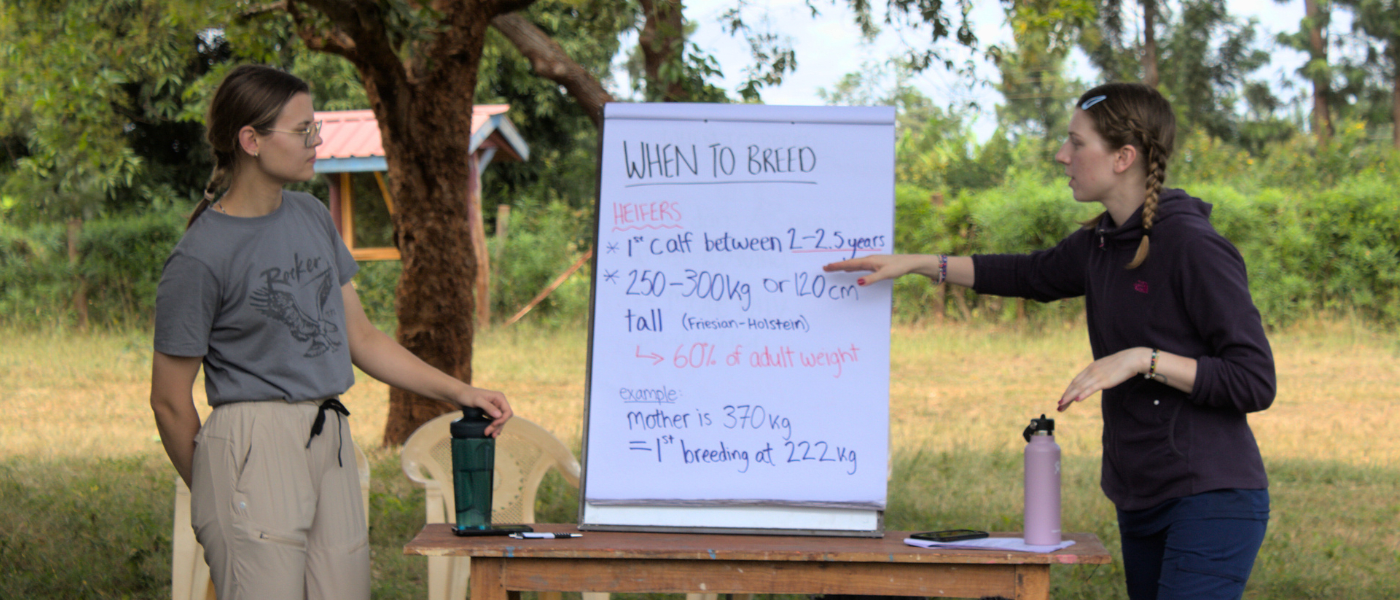 PHOTO: VETS volunteers Méli-Jade (L) and Grace Friesen (R) lead a training session on reproduction, helping farmers understand when heifers are ready for breeding.
PHOTO: VETS volunteers Méli-Jade (L) and Grace Friesen (R) lead a training session on reproduction, helping farmers understand when heifers are ready for breeding.
I hope these sessions gave COHCs the confidence to continue teaching others. Many of them showed real potential as leaders—people who could uplift their neighbors and spread knowledge far beyond our three months in the field.
Tackling Mastitis, One Test at a Time
Another part of my work was supporting a research project with the Kenya Agricultural and Livestock Research Organization (KALRO). Together, we collected mastitis testing data from 65 cows, comparing affordable pH strips with the more expensive California Mastitis Test.
While the results were less conclusive than we hoped, the experience was invaluable. It showed me the realities of field research: sometimes, even inconclusive findings help move science forward. Our data will still support KALRO in refining their tools and hopefully offering smallholder farmers a practical, low-cost option for detecting mastitis.
Mary’s Story of Change
Among the many farmers I met, Mary Karemi Ndubi from Kironya village left a lasting impression. When Mary began dairy farming in 2012, her cows produced just 2–6 liters of milk per day—barely enough to sustain her family. Through years of training with VWB volunteers, she learned how to improve her feeding practices, build a zero-grazing unit, and manage her herd more effectively.
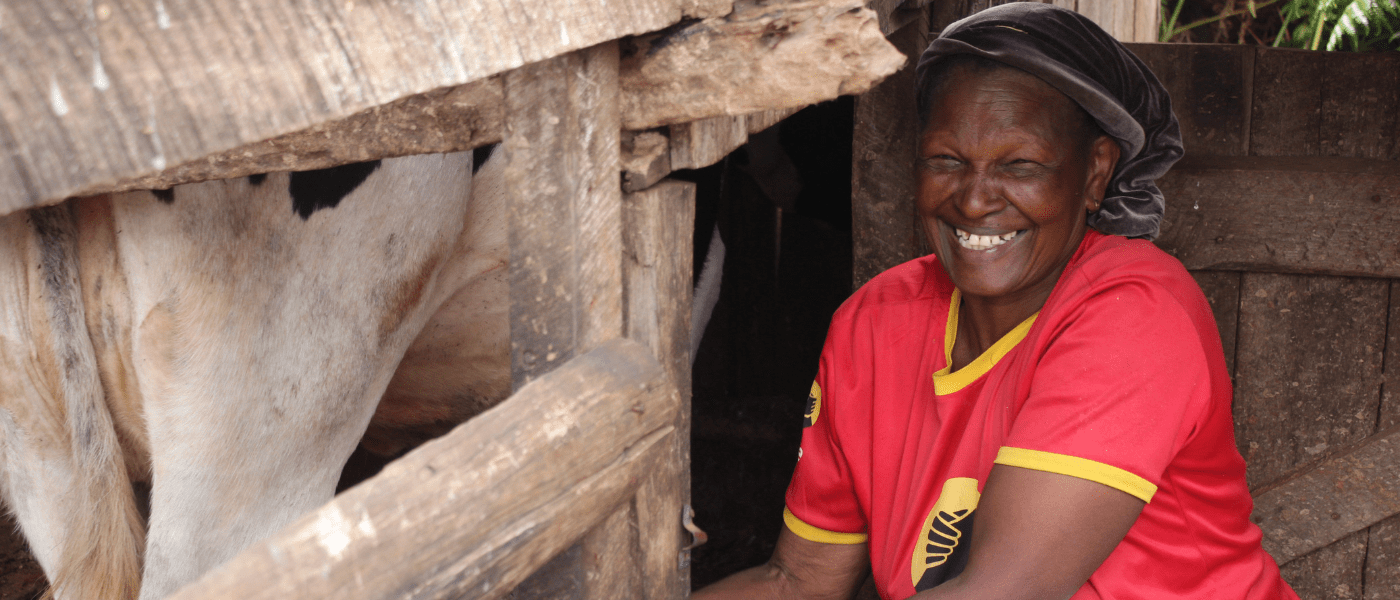 PHOTO: Mary Karemi Ndubi smiles beside one of her cows at her zero-grazing unit in Kironya village, Meru County.
PHOTO: Mary Karemi Ndubi smiles beside one of her cows at her zero-grazing unit in Kironya village, Meru County.
Today, Mary produces 33 liters of milk a day, enough to pay school fees, build a new house, and even access loans to expand her farm. She now serves as chairperson of the Kiambiriria Dairy Cooperative, training others and ensuring farmers in her community aren’t left behind.
Her story shows what this work is really about. VETS volunteers may provide knowledge and encouragement, but it’s local farmers like Mary who carry the torch forward—transforming their families’ lives and inspiring their communities.
Lessons on Gender and Communication
One of the challenges I faced was integrating gender equality into trainings. In Kenya, the cultural context is very different from what I was used to in Canada, and I didn’t always feel equipped to address gender directly. Instead, we used communication as an entry point.
Discussing how husbands and wives share responsibilities on the farm sparked important reflections. One farmer told us that after past training sessions, he had become “friends with his wife,” and now she managed the dairy while he focused on crops. Hearing stories like that reminded me that progress doesn’t always look the same everywhere—it adapts to local realities.
Reflections and Growth
One moment that stayed with me was a long day of COHC training. By the last session, everyone was tired, but farmers were still taking notes, laughing during quizzes, and asking questions. Their dedication, despite the long hours, was humbling.
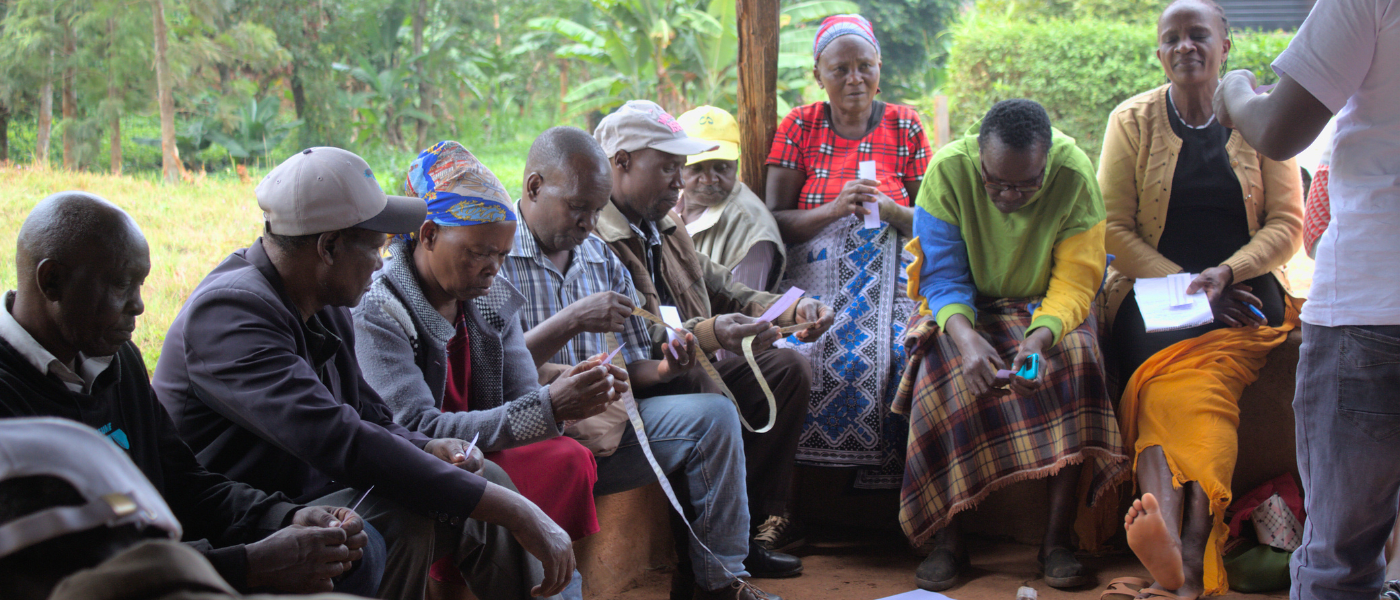 PHOTO: Farmers in Meru County practice using a weight tape to estimate an animal’s weight during a training session—determined and tireless in their learning.
PHOTO: Farmers in Meru County practice using a weight tape to estimate an animal’s weight during a training session—determined and tireless in their learning.
This experience also challenged me personally. At times, I was conscious of being perceived as an outsider, and I reflected on how history, culture, and even my skin color could influence interactions. Staying grounded meant focusing on genuine connection—working with farmers rather than speaking at them.
Above all, I learned how tangible sustainability and One Health really are. A healthy calf isn’t just about livestock—it can mean school fees, food security, or improved family well-being. Healthy cows mean safe milk for children, reliable income for households, and manure for crops that feed the community. One Health isn’t abstract—it’s lived every day in rural Kenya.
Looking Ahead
Returning home to Québec, I’ve begun working as a dairy and beef cattle veterinarian. Every day, I draw on lessons from Kenya: listening first, adapting to context, and recognizing the deep link between animal health and human livelihoods.
My time with the VETS program taught me that meaningful change comes from collaboration, humility, and persistence. I am proud to have been part of this work, and I look forward to staying involved in international projects where veterinary medicine can help strengthen communities worldwide.
Kenya reminded me that veterinary medicine is more than animal health—it’s about people, families, and futures.
VETS is an 8-year initiative (2020-2028) to improve the economic and social well-being of marginalized people, particularly women and girls, in 6 countries across Africa and Asia. In collaboration with local partners, the program is implemented through 190 Canadian volunteers on international assignment and is generously funded by Global Affairs Canada. Learn more.

